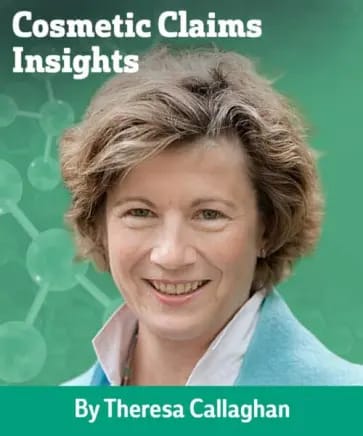
By Theresa Callaghan
At the core lies a philosophical and ethical dilemma: can beauty truly be sold as a fix? A means to an end? Or are we merely exacerbating the anxiety we helped to create? The more the industry pledges transformation, the further it distances itself from the truth—and from the individuals it claims to serve.
Our industry has always been driven by the allure of transformation. From promises of “cures” to claims of “anti-ageing” breakthroughs, our brands have long spun a narrative of perfection. However, as consumer expectations evolve, so too does the scrutiny of these promises. And don’t we know it! Consumers are no longer content with vague assurances and unsubstantiated claims—they demand transparency, evidence, and accountability. But is our industry prepared to deliver on this demand, or is it destined to crumble under the weight of its own illusions?
The Ethics of Beauty
Buzzwords dominate product labels and advertisements. However, the reality often fails to align with the marketing claims. Consumers are becoming increasingly savvy, questioning whether these assertions hold any substance. After all, when a product is marketed as “anti-ageing” but lacks concrete scientific evidence, consumers are left wondering: What’s the real benefit?
This discrepancy between promise and reality is more than just a marketing issue—it is an ethical one. Over many years, we have cultivated a culture of aspiration, but sadly, this has been at the cost of trust. Can a product truly be considered effective if its benefits are taken out of context? And should consumers be expected to trust a brand that plays fast and loose with language that sounds scientific but is actually vague?
This leads to a deeper question: Can our industry evolve to offer more honest and realistic claims? It is time for brands to recalibrate and move from promoting unattainable perfection to providing measurable, realistic results. We have expressed this numerous times, but are we doing enough? Will we do enough?
Regulation: Striking a Balance Between Innovation and Accountability
Regulation in our industry is at a critical tipping point, with the European Union leading the way in establishing standards for product claims. Under EU regulations, beauty companies are required to substantiate their claims with credible scientific evidence. Whether through in vitro tests, clinical trials, or consumer perception studies, companies must prove their products deliver what they promise.
Meanwhile, the USA lags behind, with the Modernization of Cosmetic Regulation Act (MOCRA) providing some updates, yet still leaving significant gaps in oversight. Without clear, uniform regulation, many beauty companies will continue to make questionable claims that are difficult to verify. Are consumers at risk in markets with less stringent regulatory frameworks, where distinguishing between legitimate claims and marketing hyperbole is more challenging?
While the need for regulation is clear, there is also a growing tension as innovation in the beauty industry evolves. With the rise of personalized beauty products, how can regulators keep pace? Products tailored to an individual’s genetic makeup or skin microbiome challenge traditional standards of testing and substantiation. How do you regulate claims that are inherently personalized and unique to each consumer?
Personalization: Another Mirage?
Personalized beauty products are emerging as one of the most talked-about trends in our industry. With AI-powered diagnostics and skin microbiome mapping, brands can now provide tailored skincare solutions specifically designed for each individual. On the surface, it’s an exciting development—personalization promises to elevate beauty beyond a one-size-fits-all approach.
But here’s the challenge: How do you substantiate claims made about personalized products? When a product is designed for an individual’s unique biology, its effects can vary dramatically. What happens when a personalized product works wonders for one person but has little impact on another? How do we regulate products that are inherently variable, especially when claims cannot easily be generalized?
The pressing question for our industry is whether personalized products truly signify innovation—or if they are merely another method to obscure weak evidence behind a façade of exclusivity. Can the industry demonstrate that personalized skincare solutions are genuinely more effective, or are they just another trend poised to be uncovered as a well-marketed illusion? Can biometric data be employed responsibly without straying into pseudoscience?
The Consumer Demand for More: Beyond Efficacy to Values
In addition to efficacy, consumers are demanding more from our brands—they want products that align with their values. Issues of sustainability, inclusivity, and ethical sourcing are becoming as important as product performance. Consumers are scrutinizing brands not just for how well their products work but for their stance on environmental responsibility, diversity, and corporate transparency.
Claims like “formulated for all skin tones” or “carbon-neutral packaging” now carry weight, but they also face greater scrutiny. How do companies support these claims? Are brands prepared to substantiate their environmental and ethical commitments with the same rigor they apply to product efficacy?
This raises a key point: if beauty brands want to maintain consumer loyalty, they must go beyond demonstrating that their products work—they must prove they stand for something. Authenticity is no longer optional; it’s a prerequisite for success. But can our industry keep pace with this shift, or will it fall behind in a marketplace where values matter as much as results?
Recalibrating Expectations
So, where does the beauty industry go from here? The simple answer is evolution. The days of selling flawless, unattainable beauty promises are numbered. Instead, brands should shift their focus to delivering real, achievable enhancements rather than “miracle cures.” Rather than relying on unsubstantiated claims, the industry must be honest about what it cannot deliver, while grounding its messaging in scientifically backed evidence.
Moving forward, the beauty industry must find a balance between innovation and accountability. Consumers are no longer willing to buy into illusions—they demand truth, transparency, and tangible results. Will beauty brands rise to the challenge of providing a more grounded and authentic approach, or will they continue to peddle fashion fantasies? The future of the beauty industry hinges on the answer.
As regulatory bodies catch up and innovation accelerates, the question lingers: can the beauty industry transform into a sector where integrity and transparency are as significant as the products themselves? Only time will tell, but one thing is certain—the pressure to achieve this is intensifying.
We will be discussing more about Breakthrough Science and Claims at the UK’s Society of Cosmetic Scientists Annual Meeting in London, July 2-3, 2025. https://www.scsannualconference.com/

Theresa Callaghan
Theresa Callaghan, a PhD biochemist with over 35 years of experience in corporate skin care research, has held key R&D senior roles for companies including LVMH, Unilever, Marks & Spencer, J&J, Evonik, Hill-Top Research, and proDERM. In 2008, she created Callaghan Consulting International, focusing on cosmetic claims development with brands and ingredient suppliers. She is a widely published author, frequent speaker, and contributor to peer-reviewed journals. Her acclaimed book, 'Help! I'm Covered in Adjectives: Cosmetic Claims & The Consumer', is now in its second edition and translated. She is a member of the Society of Cosmetic Scientists (SCANCOS) and British Herbal Medicine Association. Theresa serves on the editorial peer review board of the International Journal of Cosmetic Science. She also mentors, and has her own Cosmetic Claims Insights Column with Euro Cosmetics.



